Coal Tit/svartmes.

Coal tit/svartmes.
More Posts from Eggxecutive-dysfunction and Others
I remember working as a retail intern at Ikea, helping people design their kitchen on the computers.
I especially remember the anti-Karen I helped once. After spending quite a bit of time helping her, she asked to see my manager. I had just started out a few weeks earlier, and let me tell you I got so scared hearing those words. I told her my manager wasn’t here but that if she had something to say, an older colleague was in charge of us interns. She went to him (I was basically dying inside), and told him that I had done tremendously good work, and that she wished he told that to the manager. It was so kind.
I also remember the young man who, upon learning I was an intern, asked me what stuff I still had trouble doing and asked for just that. We both knew he had no intention of buying that plain stone, super expensive custom-made tabletop. But he thought it would be a good occasion for me to practice with no pressure. He let me take all the time I needed to get it right. That was nice.
The old lady I helped twice, and who wanted to add some details and order her furniture in a month or so ; when I told her I wished her well because my internship would be over by then, she seriously considered rushing a little because she wanted to keep working with me. It was nice.
The three 30ish friends who worked at some factory for what I know to be low wages, that I helped for two hours with some complicated kitchen layout. They wanted to give me a tip, even though tips are far from common in France, let alone in Ikea. I refused because it was against the rules. They insisted I was barely paid and did great work. Still no. They gave me some papers back, and I found 10 euros inbetween the pages.
The lady who also wanted to give a tip -and let me know that I should check the third drawer in the exposition kitchen. I found 20 euros there.
The woman who thanked me for making her very shy teenage daughter laugh to tears while working on their kitchen plan.
Wherever those people are now, I hope they’re well. Be kind to retail workers. It may not be much to you, but I can assure you we do remember those things even seven years later. This is just so important.


Light and Glory over Crete : The month was July, the place was the Greek island of Crete, and the sky was spectacular. Of course there were the usual stars like Polaris, Vega, and Antares – and that common asterism everyone knows: the Big Dipper. But this sky was just getting started. The band of the Milky Way Galaxy stunned as it arched across the night like a bridge made of stars and dust but dotted with red nebula like candy. The planets Saturn and Jupiter were so bright you wanted to stop people on the beach and point them out. The air glowed like a rainbow – but what really grabbed the glory was a comet. Just above the northern horizon, Comet NEOWISE spread its tails like nothing you had ever seen before or might ever see again. Staring in amazement, there was only one thing to do: take a picture. via NASA
My understanding of phylogenetics is definitely limited so maybe I'm the one who's been getting it wrong this entire time, but if you haven't done so already would you mind explaining the studies about falcons being part of the Australaves clade? I find a lot of people saying things like "falcons are closely related to parrots" which I feel is a bit misleading, but again I could be wrong. Thanks in advance!
Sure! Australaves is the name given to a clade containing the seriemas, falcons, parrots, and passeriform birds. This group was first discovered by genetic analyses in the mid-2000s. As one might expect, this was a very unexpected finding, because prior to this no one had considered that all of these birds might be closely related to each other. (For example, seriemas were traditionally thought to be more closely related to cranes, falcons were thought to be more closely related to hawks, passeriforms were thought to be more closely related to woodpeckers, and so on.)
However, many more genetic studies on birds have been done since then by different research teams sampling different types of genes, vastly greater amounts of genetic data, and larger numbers of bird species, and Australaves has been consistently supported by nearly all of these. We can be pretty confident at this point that Australaves is a real clade.

Within Australaves, parrots and passeriforms are each other’s closest living relatives, and falcons are most closely related to the clade uniting both of them (which has been given the long name of Psittacopasserae). So it would not be incorrect to say that falcons are closely related to parrots, because parrots are indeed among the closest living relatives that falcons have.
However, I’ve occasionally seen people claim that parrots alone are the closest living relatives of falcons, and that is not correct. Instead, parrots and passeriforms are together the closest living relatives of falcons, and falcons are equally closely related to both (much like how a pair of siblings is equally closely related to their first cousin, instead of the cousin being more closely related to one sibling than to the other). The group containing falcons, parrots, and passeriforms (but not seriemas) has another mouthful of a name, Eufalconimorphae!
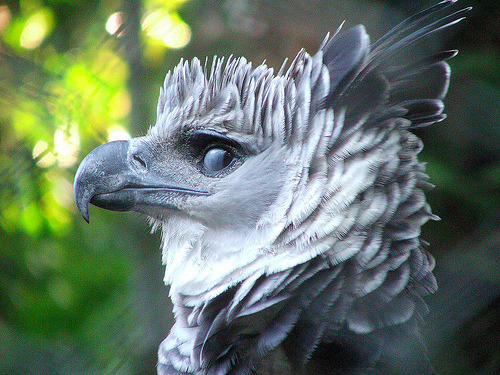
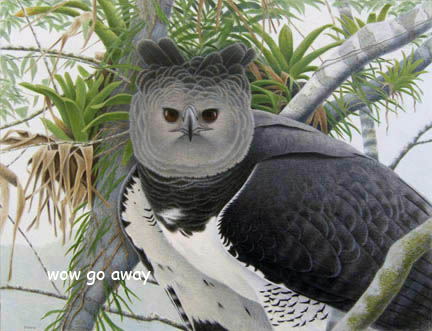
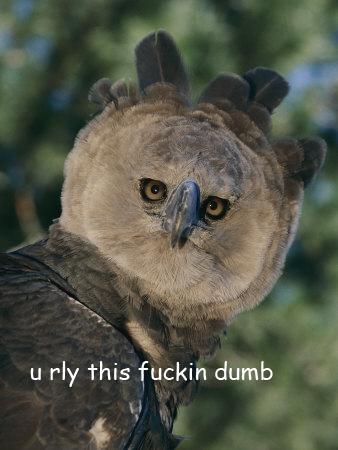
so i saw this photo of a harpy eagleand i thought “woah what a noble beast” so i searched for more photos and i just
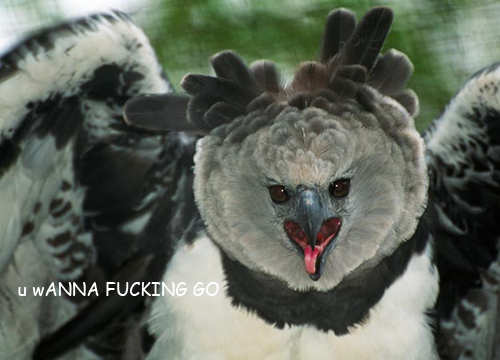
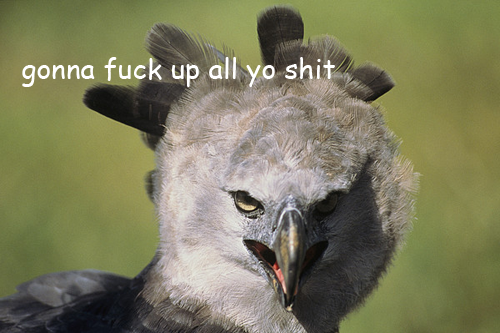
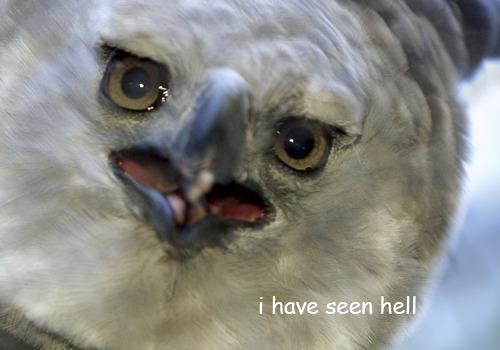
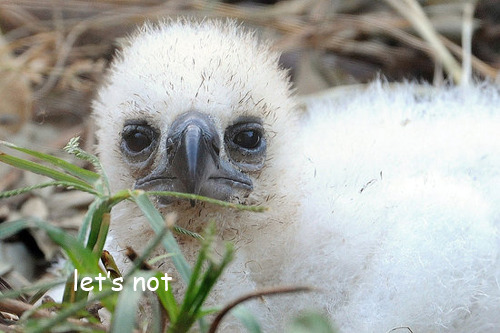
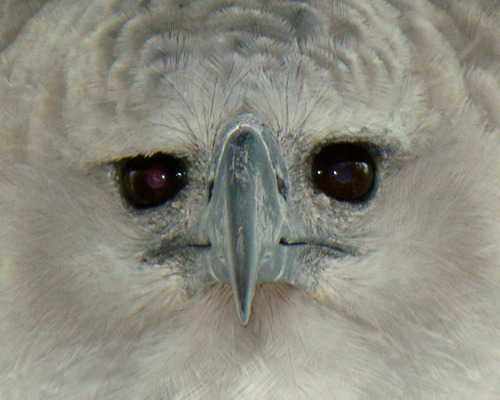
even the babiesi mean

Mountain Bluebird (Sialia currucoides)
© Richard Trinkner
never underestimate the healing power of a patch of sunlight

Horned Sungem (Heliactin bilophus)
© Carlos Goulart

Mars, Pleiades, and Andromeda over Stone Lions : Three very different – and very famous – objects were all captured in a single frame last month. On the upper left is the bright blue Pleiades, perhaps the most famous cluster of stars on the night sky. The Pleiades (M45) is about 450 light years away and easily found a few degrees from Orion. On the upper right is the expansive Andromeda Galaxy, perhaps the most famous galaxy – external to our own – on the night sky. Andromeda (M31) is one of few objects visible to the unaided eye where you can see light that is millions of years old. In the middle is bright red Mars, perhaps the most famous planet on the night sky. Today Mars is at opposition, meaning that it is opposite the Sun, with the result that it is visible all night long. In the foreground is an ancient tomb in the Phygrian Valley in Turkey. The tomb, featuring two stone lions, is an impressive remnant of a powerful civilization that lived thousands of years ago. Mars, currently near its brightest, can be easily found toward the east just after sunset. via NASA
-
 floretbunny reblogged this · 3 years ago
floretbunny reblogged this · 3 years ago -
 headsoak reblogged this · 3 years ago
headsoak reblogged this · 3 years ago -
 clockworkalpaca liked this · 3 years ago
clockworkalpaca liked this · 3 years ago -
 cosmostar liked this · 3 years ago
cosmostar liked this · 3 years ago -
 ostseedeern liked this · 3 years ago
ostseedeern liked this · 3 years ago -
 ravens-cove reblogged this · 3 years ago
ravens-cove reblogged this · 3 years ago -
 xurkitree reblogged this · 3 years ago
xurkitree reblogged this · 3 years ago -
 iateyourfish-blog1 liked this · 3 years ago
iateyourfish-blog1 liked this · 3 years ago -
 ymerstuff liked this · 3 years ago
ymerstuff liked this · 3 years ago -
 aquueerius liked this · 3 years ago
aquueerius liked this · 3 years ago -
 queen-alice2 reblogged this · 3 years ago
queen-alice2 reblogged this · 3 years ago -
 loladevalence reblogged this · 3 years ago
loladevalence reblogged this · 3 years ago -
 hpangst-lives reblogged this · 3 years ago
hpangst-lives reblogged this · 3 years ago -
 mausilein3 reblogged this · 3 years ago
mausilein3 reblogged this · 3 years ago -
 renataoliba liked this · 3 years ago
renataoliba liked this · 3 years ago -
 cozylittlebookshop liked this · 3 years ago
cozylittlebookshop liked this · 3 years ago -
 j-k-i-ng liked this · 3 years ago
j-k-i-ng liked this · 3 years ago -
 artchrisse liked this · 3 years ago
artchrisse liked this · 3 years ago -
 sansakarstark reblogged this · 3 years ago
sansakarstark reblogged this · 3 years ago -
 isahebec liked this · 3 years ago
isahebec liked this · 3 years ago -
 queen-alice2 liked this · 3 years ago
queen-alice2 liked this · 3 years ago -
 wwwjaustendo liked this · 3 years ago
wwwjaustendo liked this · 3 years ago -
 littlesugarplumfairy reblogged this · 3 years ago
littlesugarplumfairy reblogged this · 3 years ago -
 taneah001 liked this · 3 years ago
taneah001 liked this · 3 years ago -
 sadintheend liked this · 3 years ago
sadintheend liked this · 3 years ago -
 chillenergetic reblogged this · 3 years ago
chillenergetic reblogged this · 3 years ago -
 secretdiaryofanawkward reblogged this · 3 years ago
secretdiaryofanawkward reblogged this · 3 years ago -
 secretdiaryofanawkward liked this · 3 years ago
secretdiaryofanawkward liked this · 3 years ago -
 the-crow-fern liked this · 3 years ago
the-crow-fern liked this · 3 years ago -
 rivermusic liked this · 3 years ago
rivermusic liked this · 3 years ago -
 the-aromantic-dragon liked this · 3 years ago
the-aromantic-dragon liked this · 3 years ago -
 kaylaadela liked this · 3 years ago
kaylaadela liked this · 3 years ago -
 loknica reblogged this · 3 years ago
loknica reblogged this · 3 years ago -
 margaret-helmi liked this · 3 years ago
margaret-helmi liked this · 3 years ago -
 mister-dungus reblogged this · 3 years ago
mister-dungus reblogged this · 3 years ago -
 mister-dungus liked this · 3 years ago
mister-dungus liked this · 3 years ago -
 lonelyspaceman reblogged this · 3 years ago
lonelyspaceman reblogged this · 3 years ago -
 lonelyspaceman liked this · 3 years ago
lonelyspaceman liked this · 3 years ago -
 monserraaaaaaaaat liked this · 3 years ago
monserraaaaaaaaat liked this · 3 years ago -
 inkdropsandoilslicks reblogged this · 3 years ago
inkdropsandoilslicks reblogged this · 3 years ago -
 missladypugg liked this · 3 years ago
missladypugg liked this · 3 years ago -
 julia-the-keeper liked this · 3 years ago
julia-the-keeper liked this · 3 years ago -
 chiarii64 reblogged this · 3 years ago
chiarii64 reblogged this · 3 years ago -
 chiarii64 liked this · 3 years ago
chiarii64 liked this · 3 years ago -
 allwereallyneedisweed reblogged this · 3 years ago
allwereallyneedisweed reblogged this · 3 years ago -
 xcreaseproofx liked this · 3 years ago
xcreaseproofx liked this · 3 years ago


